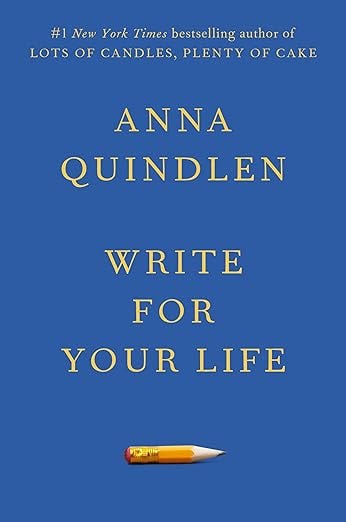Write For Your Life
Encouragement for the act of writing.
If you’d like to write more, privately or publicly, but still haven’t found your “Why”, I recommend the book Write For Your Life by Anna Quindlen. Quindlen is a Pulitzer Prize-winning journalist and best-selling author, and in this national bestseller she crafts a wonderfully compelling narrative and call to action for the act of writing.
After my father unexpectedly passed away, I spent weeks going through his papers to best arrange things for my mother. Finding my dad’s handwritten notes was a joyful experience - it felt like he was sitting next to me. It didn’t matter how “boring” the subject was — I enjoyed the hours reading his research into buying a new home appliance, his vacation planning notes, his messages to himself to follow-up with the building supervisor, and his scribbles in the margin of articles he had printed and filed away. It helped me understand, mourn, and celebrate him.
It’s probably why this passage from the book resonated with me:
If you could look down right now and see words on paper, from anyone on earth or anyone who has left it, who would that be? And don’t you, as do I, wish that person had left such a thing behind? Doesn’t that argue for doing that yourself? It doesn’t really matter what you say. It matters that you said it.
Besides this, Quindlen nudges us to translate our thoughts and feelings into words to discover who we are and what we believe in. I believe her, from personal experience, when she says that the simple act of putting words to paper, either in a personal journal/diary or a public blog, can illuminate our own lives.
If you ask me my “Why” for writing — it’s so that I can leave behind my own notes for my two boys. I hope that you can find your own “Why”, to let your unique voice flow, and to enjoy the transformative power of writing.
Here are more quotes from the book that resonated with me:
Writing is undoubtedly interaction with another human being, even if that human being is only yourself.
Written down, it lives. It’s there, it’s real. That’s the important thing. That’s why we write things down, to give them life.
The ordinary stories are sometimes the most illuminating of our lives because the simply factual can lead to the deeply philosophical. They allow us to stop time, to preserve not only who we are but who we once were.
On Anne Frank’s diaries: “She’s not really writing the story of the holocaust, although that’s what she illuminates. She’s telling the story of one small and unremarkable life that has come to stand for millions of others, and so became remarkable.”
“We write to taste life twice, in the moment and in retrospect” - quote by Anais Nin.



I'm so happy you find this post encouraging, Sharon. You're welcome. I wish you the best with your writing!
A very encouraging read for someone getting back into writing (aka me!). Thank you for sharing.